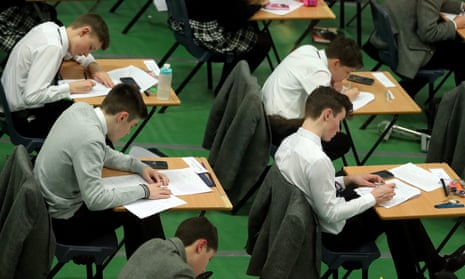The government has been accused of having “its head in the sand” over next year’s GCSE and A-level exams, as headteachers complain that amendments do not go far enough to mitigate for the disruption caused by the Covid-19 pandemic.
England’s exams regulator, Ofqual, published the outcome of its consultation on how GCSEs and A-levels will be assessed in 2021, and despite widespread objections by teaching unions to earlier proposals, they say it remains “business as usual” with content largely unchanged.
In one concession, GCSE students taking English literature exams next summer will no longer have to cover all of the topics in the curriculum and will be offered a choice of subjects in their exam papers. Ofqual also confirmed that pupils sitting their history and ancient history GCSEs next summer will be offered a greater choice of subjects at examination.
School leaders and teaching unions said the latest amendments did not go far enough. Ofqual is still to decide whether to delay the 2021 summer exams to allow for more teaching time following the disruption caused by the pandemic.
The consultation had proposed delaying the start of the GCSE exam series to 7 June 2021, after the half-term break, but the watchdog said it was still working with the government and the exam boards to consider the best approach.
“While there was general support for a delay to the exams to allow more time for teaching, respondents were less positive about this if it meant a potential delay to results,” it said.
Amanda Brown, the deputy general secretary at the National Education Union, said the government had its “head in the sand” and called for content to be reduced in other subjects.
“The government is going to need to adjust the content in GCSEs and A-levels beyond what was announced today. If the content isn’t set at a realistic level, the results will become more a measure of which groups of students lost the most access to learning under Covid,” she said.
Duncan Baldwin, the deputy director of policy at the Association of School and College Leaders, said: “We remain concerned that these plans for exams in 2021 amount only to tinkering at the edges when it is clear that students could experience widespread ongoing disruption over the course of the next academic year.”
Ofqual’s consultation originally proposed that there should not be any changes to the GCSE English literature assessment next year, but after “significant concern” among respondents about the ability to cover all the required content in the time available the regulator agreed to offer a choice of topics.
Forty-eight per cent of those who responded to the consultation opposed plans to leave the English literature assessment unaltered, highlighting the challenges for pupils trying to get to grips with complex literary texts remotely.
Paul Whiteman, the general secretary of school leaders’ union NAHT, said the changes were a case of too little, too late. “Part of the rationale for adapting assessments for summer 2021 must be to support young people’s wellbeing and mental health. Ofqual’s plans for next year don’t contain sufficient adaptations proposed to achieve this.
“Instead, schools and students are now being left in the unenviable position that they will be expected to cover as much content as possible in a reduced amount of time. This is unfair on students and it is unfair on schools and colleges.”
Ofqual said: “We understand students preparing to take exams and assessments in 2021, and their parents, carers and teachers, are concerned about the impact coronavirus has had on their education.
“We have consulted on proposals for changes to exams and assessments next year, given the disruption and potential for ongoing public health safeguards, and developed a package of measures.
“Overall, these will free up teaching time, reduce pressure on students and allow assessments to be undertaken within current public health restrictions.”
